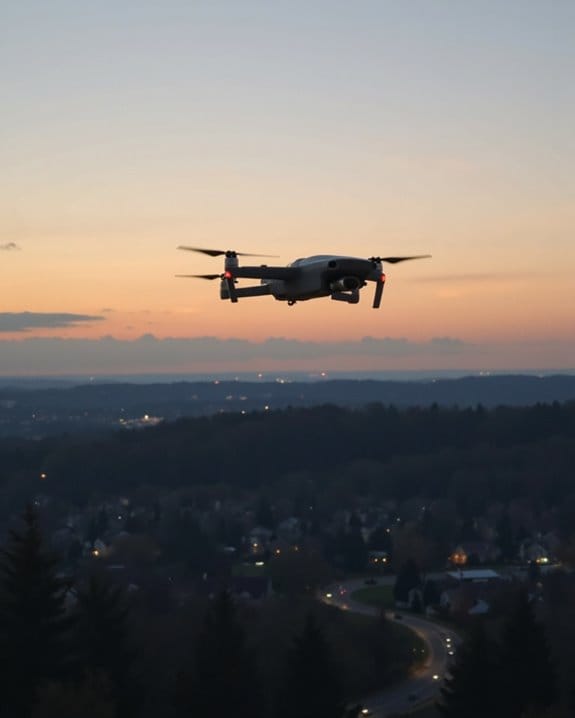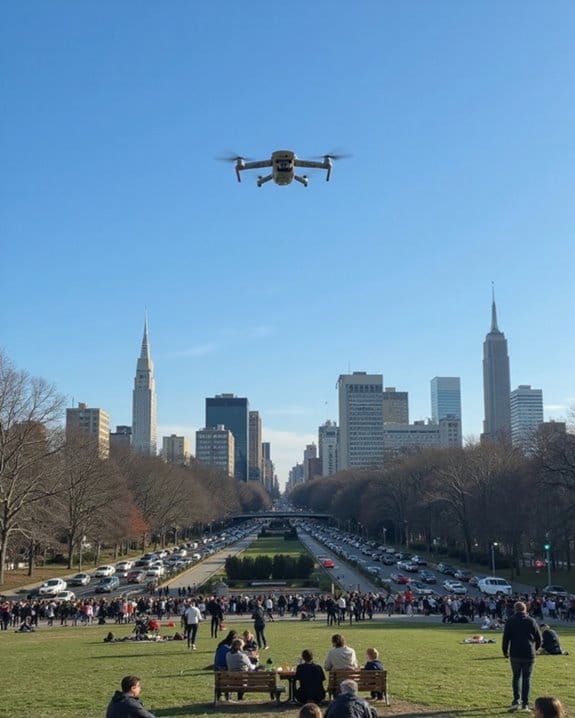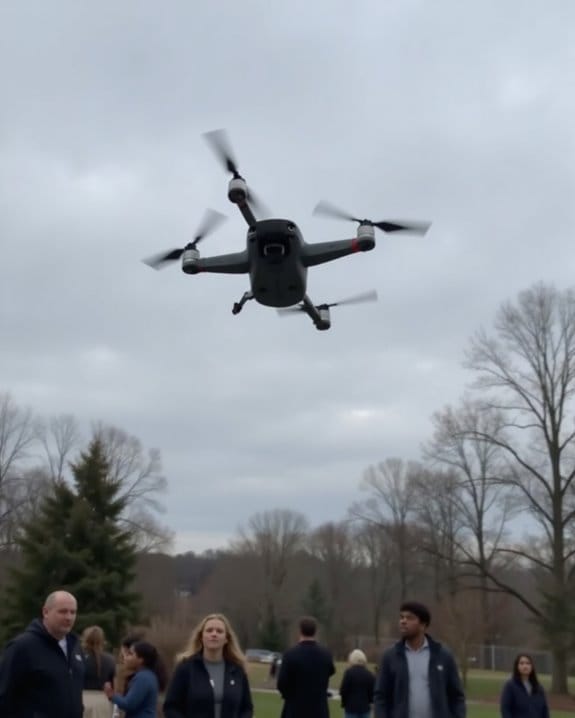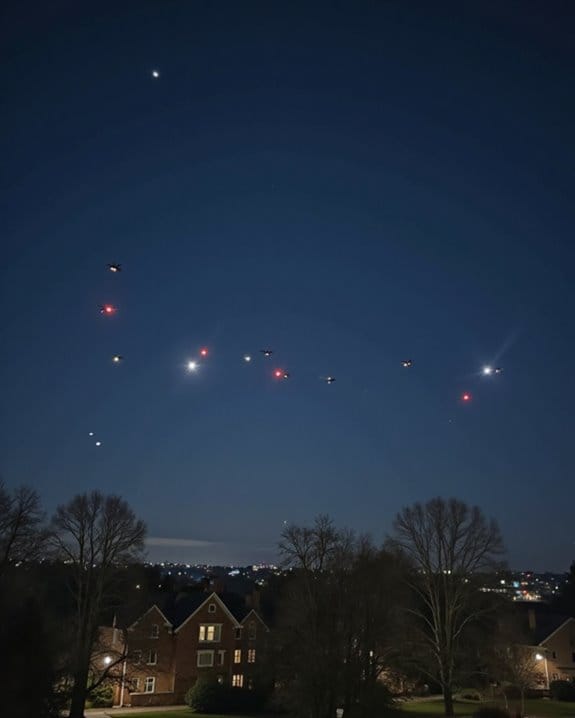Authorities in New Jersey can’t shoot down drones because it’s a federal offense—FAA rules treat drones as aircraft, and firing at them can land you heavy fines (up to $250,000) or even 20 years in prison. Only federal agencies have the right tools and legal clearance to intercept suspicious drones. Shooting is also risky: stray bullets, crashing drones, and fire hazards threaten public safety. If you’re curious about what happens instead, there’s plenty more to discover just below.
Key Takeaways
- Federal law prohibits shooting down drones, with severe criminal penalties and fines for damaging unmanned aircraft.
- Only federal agencies, not state or local authorities, are authorized to disrupt or seize drones under the 2018 Preventing Emerging Threats Act.
- Shooting drones poses serious safety risks, including fires, stray bullets, and uncontrolled crashes that endanger people and property.
- The FAA regulates all U.S. airspace, limiting state and local police to reporting drone sightings rather than direct intervention.
- Legal alternatives to shooting drones include signal jamming, physical capture devices, and tracking through FAA reporting systems.
Federal Laws Prohibiting Shooting Down Drones
When it comes to drones buzzing over New Jersey, federal law leaves little room for improvisation—unless you fancy a hefty fine or a stint behind bars. Federal law, enforced by the FAA, classifies drones as unmanned aircraft, so shooting at them isn’t just reckless—it’s prohibited. If you damage or destroy a drone, you could face a civil penalty of up to $250,000, not to mention criminal charges with prison sentences up to 20 years. The FAA’s rules, reinforced by the Preventing Emerging Threats Act, make it clear: only authorized federal agencies can take down drones for public safety. Even a retired fire captain faced federal charges for shooting at a Walmart drone. The bottom line? Don’t play air defense hero. Instead, consider safer alternatives like anti-drone devices that use frequency jamming and GPS disruption to neutralize threats without violating the law.
Risks and Dangers of Shooting at Drones
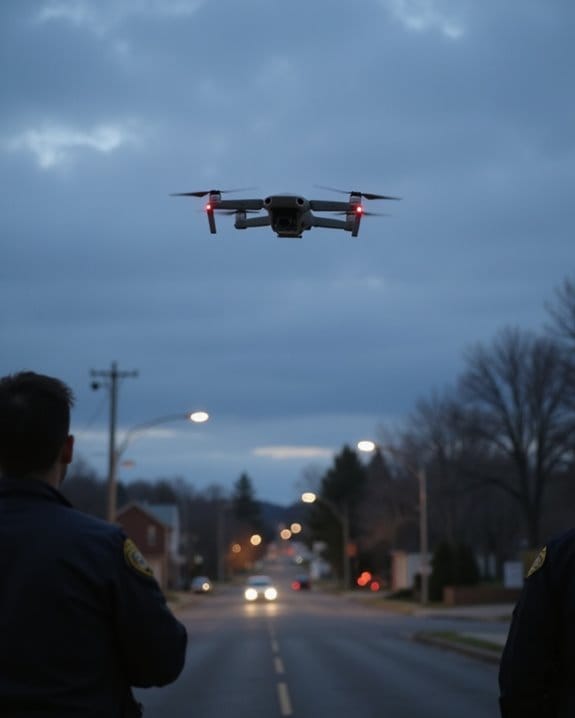
Ever wondered what really happens if you try to shoot a drone out of the sky? While it might seem like a quick fix, firing at an unmanned aircraft creates serious safety risks. Here’s why you should think twice before reaching for a gun:
- Uncontrolled crashes: A shot drone can spiral down unpredictably, causing damage to people, property, or vehicles below.
- Battery explosions: Many drones use lithium batteries that may catch fire or explode from gunfire, risking hazardous material or wildfires.
- Stray bullets: Bullets missing the drone still have to land somewhere, posing a real threat to bystanders in residential areas.
- Collisions: Disabling a drone midair turns it into a projectile, risking collisions with other aircraft.
Bottom line: Shooting drones only multiplies the danger. Additionally, many drones feature obstacle avoidance systems designed to enhance safety, making them more resilient and harder to disable by force.
Who Has the Authority to Respond to Drone Sightings?
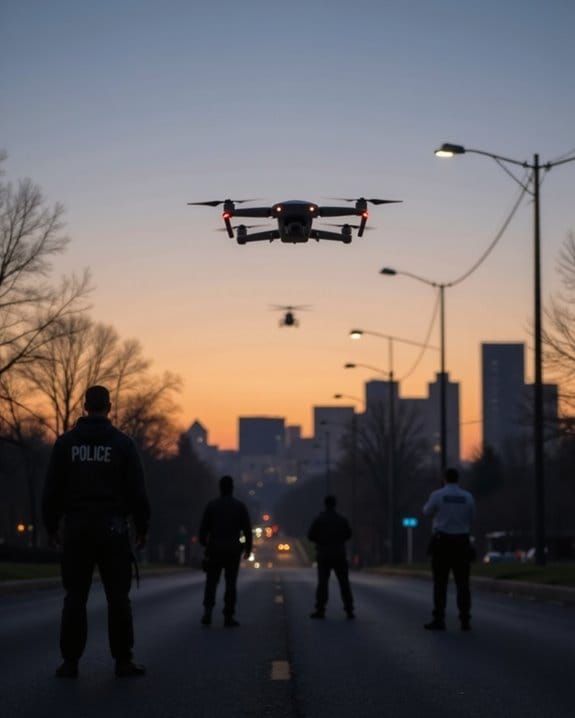
Shooting drones isn’t just dangerous—it’s also illegal for most people to even try. When you spot an unmanned aircraft over New Jersey, it’s not up to you, local law enforcement, or even state authorities to take action. Thanks to federal law under the 2018 Preventing Emerging Threats Act, only federal agencies—like the Department of Homeland Security or the military—can investigate, disrupt, or seize threatening drones. Governor Phil Murphy’s office confirms: state or local law doesn’t allow New Jersey officials to take down drones, even when national security is at stake.
Here’s how the authority breaks down:
- Federal Aviation Administration: Regulates all U.S. airspace.
- Department of Homeland Security & Military: Authorized to counter drone threats.
- Local Police: Can only report sightings, not intervene.
Operators and authorities must adhere to airspace regulations to ensure safety and legal compliance when dealing with unmanned aircraft.
Legal Consequences for Shooting at Drones
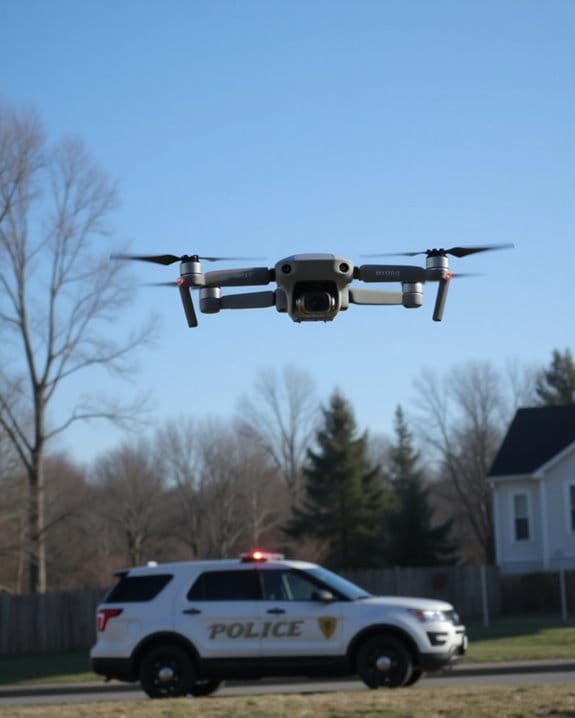
Curious what really happens if you try taking drone defense into your own hands? Shooting drones is illegal under federal law—unmanned aircraft are classified as aircraft, so firing at them violates the Aircraft Sabotage Act. That could land you with criminal charges, up to 20 years in prison, and fines reaching $250,000. The FAA isn’t shy about imposing a penalty, either; civil penalties for damaging drones can hit your wallet hard, even if the drone’s over your property.
Here’s a quick breakdown of what you risk:
- Federal law: Criminal charges and severe penalties.
- FAA: Civil penalties and fines.
- State laws: Discharging a firearm at drones may be a felony.
- Other charges: Criminal mischief or reckless endangerment.
How Authorities Investigate Unidentified Drone Reports
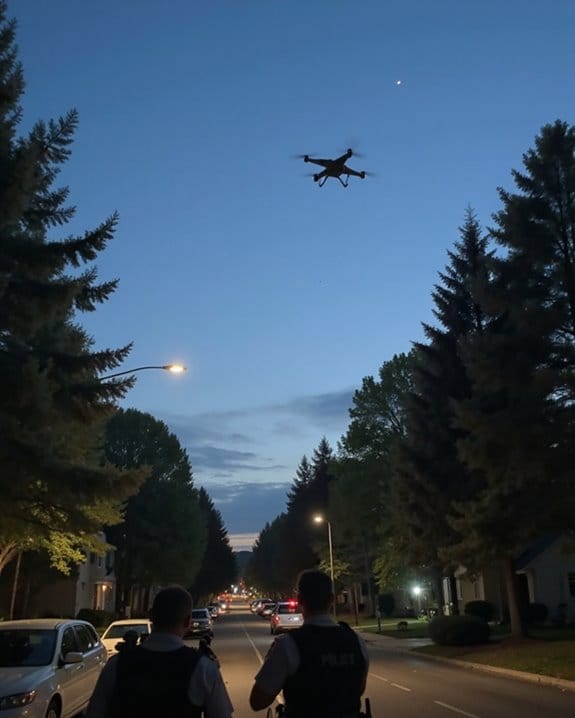
How exactly do authorities handle those mysterious drone sightings over New Jersey skies? When you report unidentified drones, law enforcement and federal officials swing into action. The FBI and DHS coordinate investigations, analyzing over 3,000 reported drone sightings just this month. Their protocol includes:
- Documenting Sightings: Officials collect detailed eyewitness accounts and encourage photos or videos.
- Tracking Flights: Specialized equipment tracks unmanned aircraft, especially if drone flights enter FAA flight restrictions.
- Identifying Objects: Investigators work to separate actual drones from misidentified manned aircraft or other phenomena.
- Enforcing Laws: Under the 2018 Preventing Emerging Threats Act, DHS can disrupt or seize dangerous drones.
Temporary FAA flight bans may be imposed to safeguard investigations. You’re not just seeing things—authorities take these reports seriously, ensuring New Jersey’s skies stay drama-free.
Political Calls for Action and Official Responses
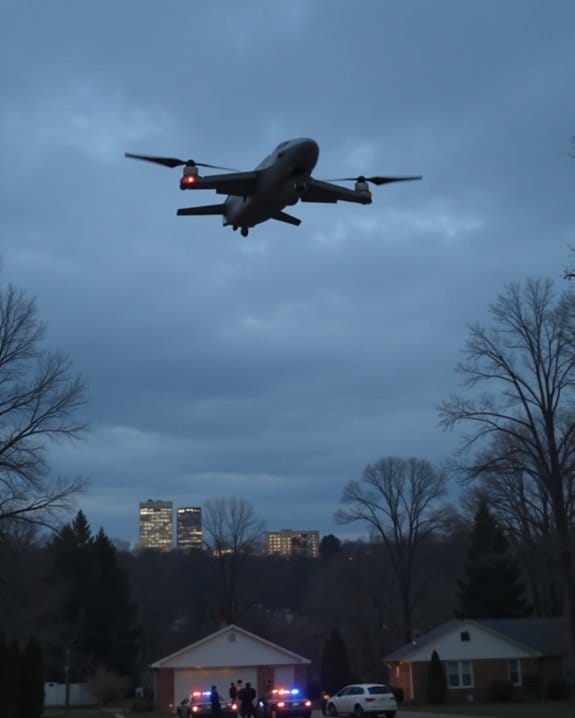
When public anxiety over mysterious drones spikes, political leaders don’t hesitate to voice strong opinions—and sometimes, they even suggest dramatic solutions. For example, Donald Trump’s Truth Social post urged authorities to “shoot them down” if the government can’t explain the drones, echoing calls from Senator Richard Blumenthal, who’s advocated for shooting down a drone over sensitive sites. In contrast, Representative Jeff Van Drew pushed for a Congressional hearing, while August Pfluger proposed empowering local officials and law enforcement through legislation—though not endorsing a federal law to shoot. The FAA and White House emphasize that only federal agencies have the authority for such drastic action. New Jersey Governor Phil Murphy agrees, calling out political fear-mongering and urging cooperative, not unilateral, responses to these airborne mysteries.
Alternatives to Shooting Down Drones
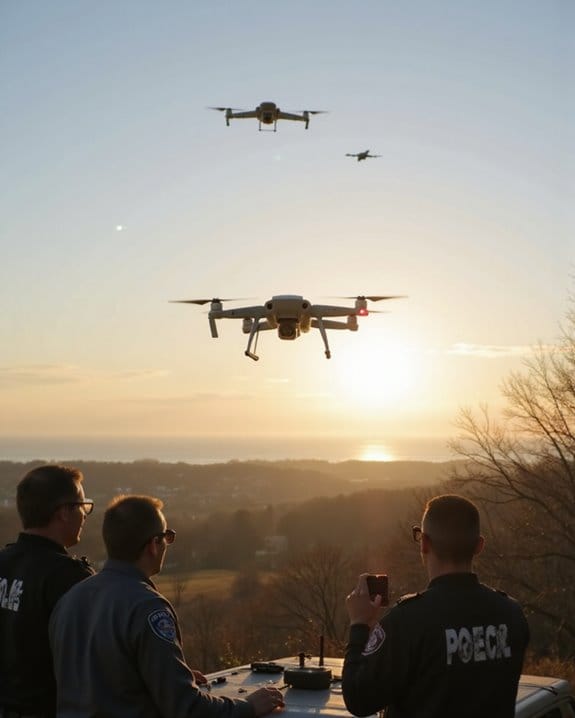
Rather than reaching for a dramatic solution, let’s look at the smarter tools authorities actually use to handle rogue drones over New Jersey.
Alternatives to Shooting Down Drones: Key Approaches
- Documenting the Aircraft: Officials focus on documenting unmanned aircraft by getting clean pictures and videos. The mayor of Pequannock encourages you to let the public know about suspicious drones, so law enforcement has clear evidence.
- Remote Disruption: Signal jamming is a high-tech option for disabling drones without destruction.
- Physical Capture: Professional services sometimes use nets to catch drones safely—no crash landings, just precision.
- Legal Tracking: If a drone’s registered with the FAA, reporting it helps law enforcement track and disable it through official channels.
Let’s focus on getting clean evidence—no Hollywood-style shootouts required.
What Residents Should Do if They Spot Suspicious Drones
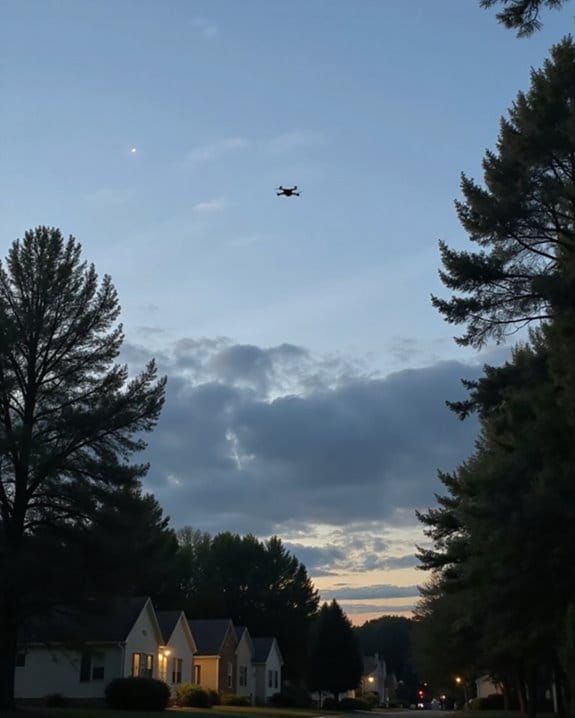
Spotting a drone hovering where it shouldn’t be can leave you wondering what to do next—but there’s a clear set of steps residents in New Jersey should follow to guarantee both safety and compliance with the law.
First, don’t try to deal with mysterious drones yourself. The FAA says shooting or interfering with unmanned aircraft could result in criminal charges from federal authorities. Instead, grab your phone—a clean picture as good as the photo provided by Brian Glenn will help law enforcement.
- Report sightings to the FBI hotline or website.
- File a complaint with the FAA online.
- Contact local State Police if the drone appears threatening.
Frequently Asked Questions
Is There a Ban on Drones in New Jersey?
You might think drones are banned in New Jersey, but they’re not. Instead, you can fly them if you follow FAA and local rules. Some areas are off-limits, yet most places allow responsible, regulated drone use.
Are the Drones Over New Jersey Looking for Radiation?
You might wonder if the drones over New Jersey are searching for radiation, but there’s no evidence suggesting that’s their purpose. Authorities and experts haven’t found specialized equipment or any links to radiation detection in these sightings.
What Is the Mystery About Drones in New Jersey?
Curiosity killed the cat, and you’re left wondering why drones are swarming New Jersey’s skies. You don’t know who’s flying them, what they want, or if they’re a threat—mystery shrouds every blinking light above.
Is It Illegal to Fly a Drone Over Private Property in NJ?
You’re probably wondering if it’s illegal to fly a drone over private property in New Jersey. It’s not, as long as you’re following FAA rules, keeping the drone registered, and avoiding safety risks or local restrictions.

